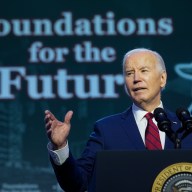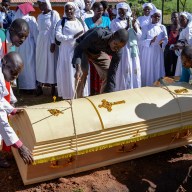VANCOUVER, B.C. – Forcing the two leaders of a controversial polygamous community in British Columbia to stand trial in a case that will inevitably test Canada’s ban on multiple marriage would be an unfair burden on the men, their lawyers argued in court on Monday.
Winston Blackmore, 52, and James Oler, 44, are the leaders of separate factions of the polygamous community of Bountiful, in southeastern B.C.
The pair were arrested in January and each charged with one count of practising polygamy. Blackmore, who has admitted to multiple marriages, is accused of having 19 wives and Oler three.
Both men are asking a B.C. Supreme Court judge to either throw out the polygamy charges against them, or at least force the provincial government to pay their legal bills.
Bruce Elwood, who represents Blackmore, told the court that it would be wrong to force the men to endure a lengthy and expensive trial under a law that repeated legal opinions have suggested may violate the charter right to religious freedom.
“The prosecution would effectively compel the accused to participate as a test litigate,” said Elwood.
“It is a controversial and complex issue, one that is woven with some history and religious significance. … This case cries out for a reference case, wherein the individual accused won’t bear the stigma, the delay and the expense of determining the fundamental core issue of constitutionality.”
Blackmore wasn’t in court on Monday, but Oler was there to watch the proceedings.
The men are members of the Fundamentalist Church of Jesus Christ of Latter Day Saints, a breakaway sect of the mainstream Mormon church, and their case will likely end up before the Supreme Court of Canada. Members of the group believe polygamy brings glorification in heaven, while the Mormon church renounced polygamy more than a century ago.
The surprising arrests came after several previous legal opinions recommended against criminal charges, instead suggesting a reference case for the courts to determine whether polygamy law could withstand a challenge under the Charter of Rights and Freedoms.
But Terry Robertson, the special prosecutor appointed to the case, told the court that laws are presumed to be valid unless a court says they’re not.
“Citizens of Canada are expected to follow the law until a court says … the law is of no force and effect,” he said.
Robertson also argued that a specific criminal case is the best way to test the constitutionality of a law.
Former attorney general Wally Oppal appointed Robertson last year amid intense and repeated public pressure to lay charges in connection with Bountiful. In the end, Robertson recommended charges.
But he was the second special prosecutor to look into the allegations involving Bountiful. Another, Richard Peck, recommended against charges in 2007.
Special prosecutors are intended to provide arm’s-length independence in cases where there could be real or perceived political interference, such as when a cabinet minister is under investigation or in highly sensitive cases such as Bountiful.
Elwood said Oppal was “special prosecutor shopping,” and argued governments can’t simply look for a second opinion if they disagree with the first.
Robertson disagreed.
“It was never intended in any way to fetter the constitutional powers of the attorney general,” he told the court.
The RCMP first investigated Bountiful in 1990, and there have been subsequent investigations into allegations including polygamy, sexual abuse, and trafficking young girls to sister polygamous communities in the U.S. to be married.
But prosecutors repeatedly shied away from laying charges, concerned such a case wouldn’t withstand a charter challenge
The Mounties launched a renewed investigation in 2005 and two years later recommended charges against Blackmore and Oler.
In 2007, Oppal appointed a special prosecutor, Richard Peck, to review that recommendation. Peck concluded a conviction would be unlikely, and said the B.C. Court of Appeal should be asked to review the polygamy law to ensure it was constitutional.
Oppal then asked another lawyer, Len Doust, to review that decision. Doust agreed with Peck.
But the controversy flared again last year after authorities in Texas seized children from a sister polygamous community. More than 400 children, including one B.C. teen, were taken into state custody before they were eventually returned.
Ten men face trial in Texas on charges including sexual assault of a child and bigamy.
The B.C. court hearing is expected to continue throughout the week.
















